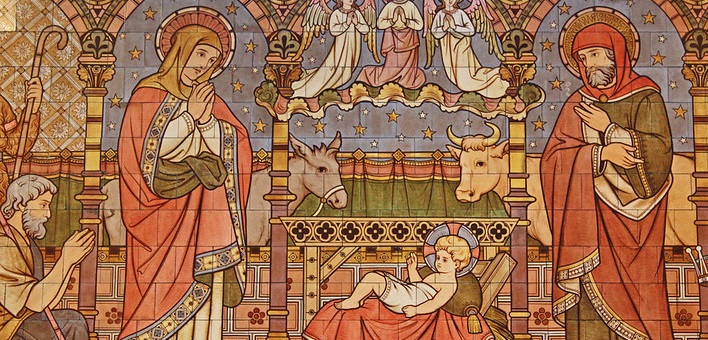Commentary on Psalm 96
Let’s face it, this night belongs to the newborn Jesus, Mary and Joseph, along with shepherds, a chorus of angels and some sheep and cattle.1
It is a celebration of the birth of Jesus and a time when the church gathers to hear the familiar story and to sing Christmas carols with family and friends. It is one of the highlights of the church year.
To write about another text seems an effort in futility. All other texts will play supporting roles this night. But there is no more appropriate text to aid in telling the story than Psalm 96. The psalm is one of the Yahweh-melek psalms which praise God as King (Psalm 93, 94-99). It is embedded in our carols; “Joy to the world, the LORD has come,” “Peace on the Earth, Goodwill to All from Heaven’s all-gracious King,” “This, this is Christ the King, whom shepherds and angels sing.” Tonight the carols proclaim the same story as the angels—the baby is not ordinary, but is indeed King and Creator of All.”
Psalm 96 is exuberant praise of the King and Creator. Its focus is worship, and the call is for the whole world, the earth and all that is in it, and the heavens to sing the praises of the LORD. It opens with a call to “sing a new song” and this night calls for a new song, for God has sent the Son to live among us and show us the way to salvation and a righteous life. Tonight once again, God has a new song for an old people, another chance to start over and hear the amazing stories of this One. The response to that new song is to join in the celebration offered by God to the world (verses 1-3).
The call to sing is followed by the reason for our praise, and it is centered in God as the Creator of all. Christmas Eve is not often a time when God as the Creator is praised. Yet, the wonder of creation is on full display: the animals in the stable, the stars in the sky, the baby, the new parents. They all testify to the wonderous creation of our Lord which surrounds us every day. This baby and its new family are not tucked away in a bedroom in a house of servants and stuff, but in the world where creation and its gifts surround the child. The next seven verses are calls to praise that move through that very creation.
Verses 7-9 focus on the “families of the peoples.” Here there is no division into denominations, or cultures, or political parties. We are families of peoples, related by the Creator who we are called to praise. The psalm calls us to declare the Lord’s attributes on which the world is founded: glory and strength. It calls all to worship and together bring offerings and enter God’s presence. It is the call to worship as announced by the angels. The shepherds follow from their fields to the stable. These shepherds represent all the families of peoples as they bow before the baby.
In verse 10, the nations are called to declare “the Lord is king.” It is easy to pass over this verse, but if you look at it, it is radical theology. From the moment this baby draws a breath and even before the angels sing, this baby is seen as a threat by those currently holding power. Encapsulated in verse 10 is all the reasons that this baby’s story will pass through Golgotha. Rome will tolerate no other king and a message of “judging all of the people with equity” will not be well received by those in Judah who see themselves as superior to others and more deserving of God’s favor. Jesus’s message will shake the foundations of power. The nations here are called to set aside their own visions of power and praise the one who is truly King. It is a vision that we are still waiting to fulfill.
Verses 11-12 adds creation to the chorus: the heavens, the earth, the sea, and the fields and all that is in them and the trees will all sing to the Lord of all. By verse 12 everyone, every principality, every tree and bird and fish and flower are called into a loud chorus of praise for their Creator and King. It is on this night, that just for a few moments, we can almost believe this is possible. Imagine all the world engaged in nothing but praise!
The psalm ends with the reason for all of this praise and jubilation; the Lord “is coming to judge the earth.” So often God’s judgment is seen as a way to vindicate some and destroy others, in other words, an instrument of power. But here in this psalm, we praise God because God will judge the world with righteousness and the people with truth. The King has come and now is time to raise voice and instrument and tree and stars an flowers and sheep to sing, and sing, and sing “Joy to the world; the Lord has come!”
Notes
- Commentary first published on this site on Dec. 24, 2018.


December 24, 2021